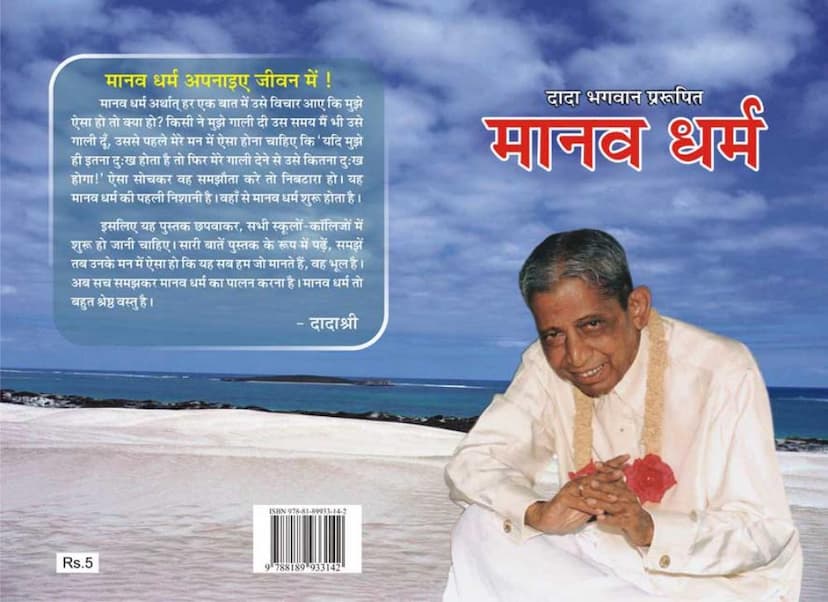Manav Dharma
Added to library: September 2, 2025

Summary
Here's a comprehensive summary of the Jain text "Manav Dharma" by Dada Bhagwan, based on the provided pages:
Book Title: Manav Dharma (Human Dharma) Author: Dada Bhagwan (Shri Ambalal Muljibhai Patel) Publisher: Mahavideh Foundation
Core Message:
The central theme of "Manav Dharma" is the profound and practical definition of true human dharma, emphasizing empathy, consideration for others, and the principle of "do unto others as you would have them do unto you." Dada Bhagwan clarifies that this is not about adhering to religious rituals or denominations, but about a fundamental ethical conduct rooted in understanding the suffering of others.
Key Concepts and Definitions of Human Dharma:
- Empathy as the Foundation: The cornerstone of human dharma is the ability to think, "If this happens to me, how would I feel?" This principle should guide every action and interaction. For instance, if someone abuses you, before reacting, consider how much pain you would feel if you were in their situation, and let that empathy lead to resolution.
- "Don't Cause Suffering": The most significant aspect of human dharma is ensuring that one's actions do not cause any suffering to any living being, especially other humans. Even minor pain inflicted by you is a transgression of human dharma.
- The Golden Rule in Practice: The book reiterates the universal principle: "What you don't like, don't do to others." If you dislike being insulted, don't insult others. If you dislike being struck, don't strike others.
- Returning Lost Items: An illustrative example is finding lost money. The human dharma is to consider the distress of the owner and actively try to return it, even by placing newspaper ads. Keeping it or distributing it without trying to find the owner is a deviation.
- Respecting Others' Property and Dignity: This extends to not looking at another person's wife or daughters with ill intent, understanding that such actions would be painful if done to your own loved ones.
- Living within the Law of Nature: Human dharma involves living according to one's rightful share ("hak ka bhogav") and not taking what belongs to others, whether it's material possessions or emotional well-being.
- Consequences of Actions (Karma): The text strongly emphasizes that actions have consequences. Violating human dharma can lead to lower states of existence (animal, hellish realms), while upholding it paves the way for higher states and ultimately, liberation (moksha).
Dada Bhagwan's Teachings and the "Akram Marg":
- The "Akram Marg" (Non-Sequential Path): Dada Bhagwan presents a shortcut or "lift" path to spiritual liberation, known as the Akram Marg. This is contrasted with the "kram" (sequential) path, which involves gradual spiritual progress.
- Self-Realization: The ultimate goal is self-realization, understanding "Who am I?" and the nature of the self.
- The Role of the Gnani Purush: Dada Bhagwan explains that the "Dada Bhagwan" resides within everyone, but in him, it is fully manifest. He empowers others to attain self-knowledge in a short time through a process called "gyan-siddh."
- Continuing the Legacy: After Dada Bhagwan's physical departure, his work is carried on by his disciples, notably Dr. Niruben Amin and Shri Deepakbhai Desai, who continue to impart self-knowledge through Satsang.
- Importance of Direct Knowledge: While books are valuable guides, true spiritual awakening comes from receiving knowledge directly from a self-realized being.
Critique of Current Practices and Societal Issues:
- Loss of True Humanity: The book laments the decline of true humanity in the current era (Kalyug), where people are often consumed by selfishness and forget the basic principles of considerate behavior.
- Misunderstanding of Human Dharma: Many people have a superficial understanding of human dharma, confusing it with religious affiliations, charity, or simply avoiding certain foods.
- Flawed Charity and Welfare: Dada Bhagwan criticizes well-intentioned but misguided efforts of charity and social service that can inadvertently make people dependent or encourage negative behaviors like alcoholism. He advocates for empowering individuals through employment and self-reliance rather than mere handouts.
- The Problem of "Underhand" Behavior: The text addresses how people often misdirect their anger or criticism towards those "underhand" (subordinates or those weaker), while showing deference to superiors. True human dharma requires equitable treatment and consideration for all.
- The Need for Education: Dada Bhagwan stresses the importance of disseminating this true understanding of human dharma through books, especially to younger generations in schools and colleges, to instill these values from the beginning.
Progression of Human Dharma and Beyond:
- Levels of Human Dharma: The book suggests that human dharma is not monolithic. It varies based on individual development, cultural background, and even nationality. However, the core principle of minimizing suffering remains constant.
- Beyond Human Dharma: While human dharma is crucial, it is a stepping stone. The ultimate goal is to transcend even human dharma and move towards spiritual liberation (moksha) through the realization of the Self.
- The Power of "Understanding": True adherence to human dharma comes from a deep, internalized understanding, not just intellectual knowledge or adherence to rules.
In essence, "Manav Dharma" by Dada Bhagwan is a practical guide to living a life of profound empathy and ethical conduct. It aims to awaken individuals to their true human potential, urging them to prioritize the well-being of others and, through this understanding, pave their way towards spiritual growth and ultimate liberation.